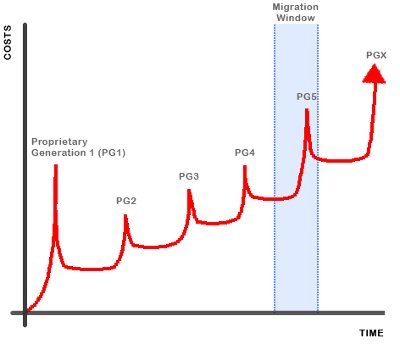True cost of migrating to open source

perspective I was hugely entertained by the latest piece of Microsoft spin: apparently the recession is putting a dampener on migrations to open source.
Of course, "="" rel="follow">Conservative MEP Daniel Hannan put it: "The government has run out of our money."
Nevertheless, I agree with Brown that this is an international crisis and one that demands an international response, even though not all countries are in the same dilapidated condition as the United Kingdom.
Responding to the crisis
How do we, as technologists, respond to the reality of far less money, increased competition in a shrinking market and the ceaseless demands by management for innovation? How do we square this circle?
Microsoft knows the answer is free and open source software, just as well as we do. It has spent a fortune analyzing the 'threat' and has chosen the cost of migration as the attack most likely to succeed.
The reason migration makes such a great target is that it is the period in the IT lifecycle where IT is most vulnerable, likely to receive the highest level of criticism, and where it encounters the greatest costs. A botched migration can be a career-terminating event.

Figure 1: Typical cost profile for proprietary software migrations
Microsoft's argument is that it costs more to move from one generation of proprietary software to free software than it does to move from one generation of proprietary software to the next. Like all good propaganda, the payload depends on it appearing logical and on it being capable of appearing true if you measure it in a certain way.
The IT cost profile for most organizations is similar to that shown in Figure 1:
- Costs peak at each migration with outlays on hardware and software, retraining, additional staff and consultancy.
- They then drop to the long-term level, which includes a hefty proprietary-license component. Your local proprietary vendor will do its very best to ensure these long-term costs increase year on year.
- The cost of migration is generally considered to be the period around the peak. I have highlighted the most recent migration in the graphic.
The cost-of-migration propaganda works only if:
- You buy the line that proprietary-to-free is more expensive than proprietary-to-proprietary.
- You ignore long-term cost savings and look only at the narrow strip around the migration itself.
- You do your costings using only neo-proprietarist, commercial open source and ignore real free software, which is of course exactly what Microsoft and those like them want you to do.
Proprietary-to-free migrations
The real picture of proprietary-to-free migrations for most organizations is similar to Figure 2.
If you work with real free software, not neo-proprietary versions, the worst-case peak cost of migration is no greater than the proprietary-to-proprietary kind.
If you also look beyond the migration window defined by the proprietarists, you will see that the really substantial savings accrue over time. So, project return on investment is better than proprietary-to-proprietary, with long-term sustainable cost reductions across the whole infrastructure.
That simple fact is why, despite propaganda to the contrary, free-software migrations are accelerating in the current economy.
Figure 2: Typical cost profile for a migration from proprietary to open source software
As chief executive of Sirius Corporation, Mark Taylor has been instrumental in the adoption and rollout of open source software at some of the largest corporations in Europe, including a growing number of companies running exclusively on free software, end to end, server to desktop. A direct participant in some of the leading enterprise open source projects, Taylor is also a well-known authority on all aspects of the open source phenomenon.